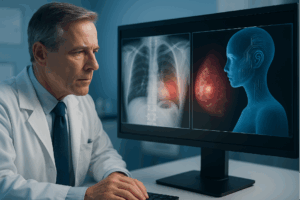A revolution in Artificial Intelligence (AI) “co-pilot” technology is being rolled out through healthcare systems globally, helping doctors diagnose cancer faster and more precisely. From chest X-rays to pathology examinations, AI is serving as a reliable second opinion, improving early-stage detection and assisting overburdened medical professionals.

AI-Supported Chest X-Rays: A Game-Changer in Lung Cancer
The development is part of the Yorkshire Imaging Collaborative, a regional imaging network, and is supported by the NHS AI Diagnostic Fund, which has provided £21 million ($27 million) to 11 imaging networks across the nation. As per the trust, it carries out around 135,000 chest X-rays annually. The system reads chest X-rays, identifying 124 conditions, indications of lung cancer, and severe infections. By analysing about a third of all the chest X-rays conducted in England, it assists in prioritizing life-or-death cases, minimizing diagnostic delays, and alleviating backlog pressure.
Radiologists are now being provided with annotated images showing possible abnormalities, allowing for quicker review and diagnosis. Because of this, the AI system is becoming an important tool for the identification of patients who require urgent follow-up, possibly for helping detect and catch cancers earlier when therapy is most effective.
Click to get AI in Cancer Diagnostics Market Full Report Description + Research Methodology + Table of Content + Infographics @
https://ai.omrglobal.com/report-gallery/artificial-intelligence-in-cancer-diagnostics-market/
Global Push: AI as a New Frontier in Cancer Detection
Throughout the UK, large-scale trials are being conducted to integrate AI in cancer screening. One of the largest such trials involves the use of AI in breast cancer screening, covering 700,000 mammograms from 30 screening centres. Following successful outcomes from Sweden, preliminary evidence indicates AI can halve radiologist workload without raising false positives. At the same time, in NHS Wales, several researchers are testing Paige’s AI-based diagnostic software for cancer screening. And in India, Telangana is rolling out AI throughout government hospitals to increase detection rates for breast, oral, and cervical cancers across under-served areas. These projects objective to overcome the shortage of radiologists while offering earlier, more equal cancer diagnosis.
Why Trust AI as a ‘Co‑Pilot’?
- Speed and Accuracy: AI systems analyze huge sets of medical images and documents in a matter of seconds, while decreasing human error and standardizing interpretation among clinicians.
- Workflow Integration: Co-pilot systems are designed to complement, not replace, medical professionals, highlight priority findings while enabling clinicians to confidently validate final results.
- Elastic Scalability: In regions with restricted specialists, AI assists rural clinics and urban hospitals, allocating diagnostic capability fairly.
- Constant Learning: AI systems get better over time by adding new data, refining models, and expanding diagnostic capabilities, facilitating continuous innovation in cancer triage and staging.
Conclusion
AI co-pilots are becoming essential tools in cancer diagnosis, reducing backlogs, enhancing accuracy, and addressing care gaps in underserved communities. Globally, health systems are adopting AI to drive early detection, from lung cancer to breast imaging, pioneering a new age of data-led oncology. With ongoing validation, ethical supervision, and clinician engagement, AI holds the promise to revolutionize cancer care pathways while saving resources, time, and most importantly, lives.
